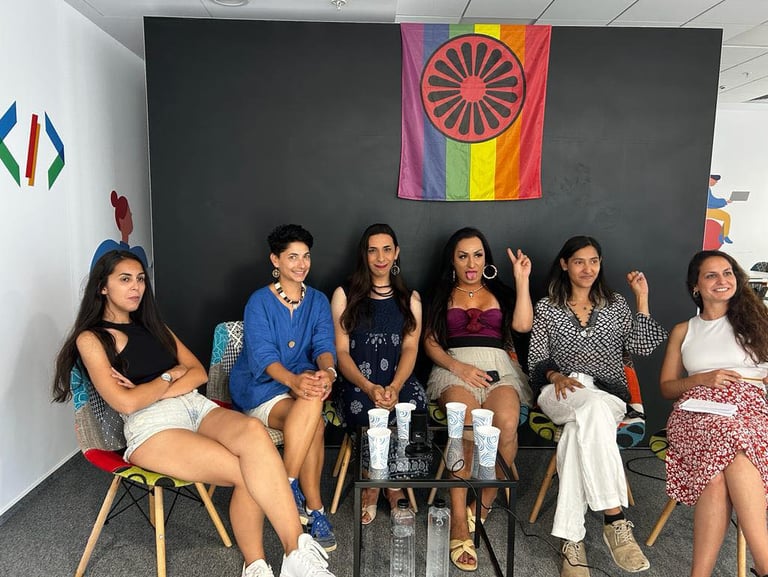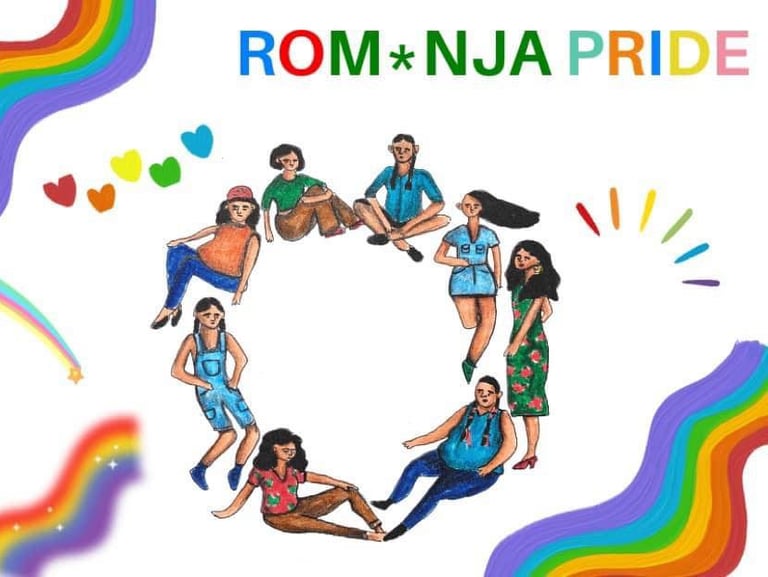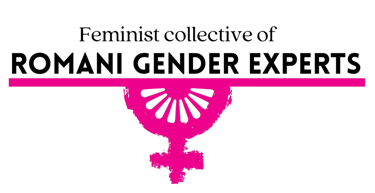Dilemmas of intersectionality - a debate
Manifest
In cooperation with E-Romnja - debate available here
We, Roma feminists, Queers, transgender, lesbians and allies, raise our voices against racial inequalities among the mainstream LGBT+ and feminist movements across Europe.
On a daily basis we are facing racism along with homo*lesbo*transphobia, classism and sexism in our communities and spaces.
But it is particularly disturbing that during the Pride month we are excluded again or invisibilized.
In different countries Roma LGBT+ still don’t feel included in the movement nor in Pride’s from planning. When invited by ngo’s or collectives, many of us feel scrutinized based on the gadje’s criteria and values. Our words are counted, our stories are invalidated or invisible, our behavior is considered too loud and too aggressive. Some of us can join, if we share the common language, the values of respectability and presentability. For many Roma LGBT+ these spaces remain exclusive, elitist, and white.
We encourage all Roma LGBT+ to attend the Pride and make it colorful. We want to be part of the movements with all our identities. We will not be tokens to satisfy the appearance of diversity or intersectionality! Instead, we demand inclusion and space to reclaim our rightful place in our own terms and conditions!
We are aware of the vulnerabilities and struggles in our communities and spaces. We all share different oppression systems and fight to dismantle the power dynamics that perpetuate discrimination. By possessing a discriminated identity or sexual orientation doesn't make communities/collectives less racist or sexist. At times there have been different allegations of racism and violence towards Roma LGBT+ in different spaces. Or stories whitewashed, to be accepted. As if our voices or stories are too disturbing and must be said in such a way as to satisfy the majority’s expectation.
We are revolted at the unjust portrayal of Roma women LBGT+ as aggressive, violent or unsafe for the gadje and white NGO’s or groups only serves to uphold stereotypes and prejudices, reinforce racism, and perpetuate harmful narratives.
It is time we stay united against those who are trying to cancel, erase or make invisible our experiences and voices!
We denounce the exclusion and marginalization of Roma trans, Roma lesbians, and Roma Queers from Feminist and Queer spaces, ngo’s or groups, orchestrated by those who seek to maintain their power and privilege.
Our presence in the social movements should not be contingent upon fitting into white gadje standards or rainbow capitalism, but on the recognition of our diversity, experiences and positions based on racial injustice. The existence of racism within the Feminist and Queer movement endangers our survival not just the representation.
With our voices, bodies, colors, and identities we challenge the Feminist and Queer movements, to:
➢ Acknowledge our struggles and cultural differences
➢ Contribute to better inclusive spaces
➢ Talk about power imbalance
➢ Acknowledge privilege and fragility
➢ Speak up and against racial injustice
➢ Stand in Solidarity even if its uncomfortable
We, as Roma feminists, Roma Queers, activists or allies no longer tolerate racial injustice or discrimination. We will stand together, with love, respect, values, our struggles, our history, the oppressions, our culture and care for each other. For a more inclusive Pride, for more inclusive spaces, for a more inclusive society.
Signatures:
Carmen Gheorghe, romnja feminist and activist, co-founder E-Romnja Association Aldessa Georgiana Lincan, Roma Feminist Activist
Sandra Selimovic, Roma Artist , co-founder RomanoSvato
Roxana Magdalena Oprea, Roma Feminist Activist
Alba Hernández, Co-founder Feminist Collective of Romani Gender Experts Antonella Lerca duda, roma transgender and ex political candidate, writer and activist
Oana Dorobanțu, media manager EL*C - EuroCentralAsian Lesbian* Community Alexandra Corcoveanu, roma -queer activist feminist
Izabela Marin, romnja queer activist
Cat Jugravu, Theater Maker, Founder of QUEERDOS Berlin
Elena Sirbu, Journalist and President of PFR ROMNI
Dezso Mate, Social science researcher, Roma LGBTI activist
Patricia Caro Maya, Psychology researcher
Demetrio Gómez Ávila, Rroma Activist in sexual and gender desidence
Sandra Carmona Durán, Roma Artist and lesbian Activist.
Svetlana Kostić RomaniPhen e.V. Berlin
Marina Csikós, Co-founder Feminist Collective of Romani Gender Experts
Maria Dumitru, researcher
Roxanna-Lorraine Witt, Co-Founder and President of save space e.V. - Political Representation of LGBTIQ* and FLINTA* Sinti and Roma in Germany, Researcher, Activist, Romani Queerfeminist
Janine Christine Rutkowski aka Witt, Founder of the Sinti &Roma group "Starke Sintezze und Romnja Mütter" , writer and politician
Andrei Șerban, roma artist and activist
Cristina Mitroi, romnja queer feminist and activist, part of the initiative group Mad Pride
Florentina-Alexandra Manea, romnja feminist activist
Gianni Diamanto Jovanovic Artist, Founder of Queer Roma
Ana Jovanovic-Romani LGBTIQ+ Human rights monitor-European Roma Rights Centre CADO- Centrul de Advocacy si Drepturile Omului (Advocacy and Human Rights Centre) Pepi Fernández Camacho, social worker, feminist activist, gender expert
Saska Jovanovic - segretar associazione ‘Romni aps’, loItaly
Saska Jovanovic - president of ‘Associazione ROWNI - Roma Women Network Italy aps’ Saska Fetahi - president of ‘Udruzenje Romnji Srbija’
Robert Gabris, Artist, Vienna
László Farkas, media worker - artist, Berlin
David Tišer, director of ARA ART, z.s. Czech Republic
Lucie Lucassen, crisis manager of ARA ART, z,s, Czech Republic
Rowena Marin, roma writer
Petro Rusanienko, Roma Director, Actor, Producer, Ukraine
B-Hábel Géza - Director (CEO) of Diverse Youth Network, Hungary , Pécs
Atanas Stoyanov, Roma activist
Sebijan Fejzula, militant of Kale Amenge, Roma anti-racist collective
Margareta Matache, Roma scholar, USA
Edita Rigova, Roma scholar, Slovakia




“Reflections on Romani Queer Representation and Challenges Within Mainstream LGBTQ+ Movements”
The panel discussion centered on the representation of Romani Queer individuals within mainstream LGBTQ+ movements and the challenges they face. The key points discussed include:
Inadequate Representation in Pride Events: The Romnja Queer observed a lack of representation of Romani Queer individuals in Pride events and Queer movements in EU. The movement has become predominantly white, capitalist, and exclusive, with little space for minority voices.
Tokenization and Misuse of Intersectionality: The concept of intersectionality is often misused, particularly with tokenization. Minority individuals, like Roma Queer, Romnja lesbian and trans, are invited to some events during Pride but not fully part of the organization. Intersectionality tends to prioritize some identities over others, sidelining the experiences of Roma individuals.
Standardization and Stereotyping: Romani Queer individuals face pressure to conform to standards set by the majority. These standards include speaking a certain way, dressing in a particular manner, and suppressing emotional expression. The mainstream movement often only accepts those Roma who are "exceptional" and “different”, perpetuating invisibility for the majority, racism, classism, and sexism.
Creating Separate Spaces: Some of Romnja suggested the need for a separate Roma Queer movement. This would provide a safe and empowering platform to express identities, as the mainstream movement does not adequately represent and include Romani Queer experiences.
Responsibility for Creating Spaces: The responsibility lies with the majority to create inclusive spaces for Roma Queer individuals. The Roma community lacks resources, and the mainstream movement must provide the support needed to create spaces where Roma voices can be heard authentically.
Empowerment Through Self-Representation: Creating their own spaces empowers Romani Queer individuals. These spaces challenge systemic racism, offer healing, and raise awareness about discrimination faced by the community.
Intersectionality Prioritization: Within the mainstream movement, certain identities like ethnicity and color are often given less priority compared to sexual orientation and gender identity. This denies the multi-layered experiences of Romani Queer individuals.
Lack of Progress: There has been minimal progress in the representation and inclusion of Romani Queer individuals over the years. Sexism further affects Romani women, making them even less visible within the movement
In conclusion, the discussion highlighted the urgent need for genuine inclusivity within mainstream LGBTQ+ movements. The experiences of Romani Queer individuals need to be acknowledged, valued, and integrated into the movement's fabric. Creating separate spaces, challenging stereotypes, and amplifying Romani voices are vital steps toward a more diverse and equitable LGBTQ+ movement.
